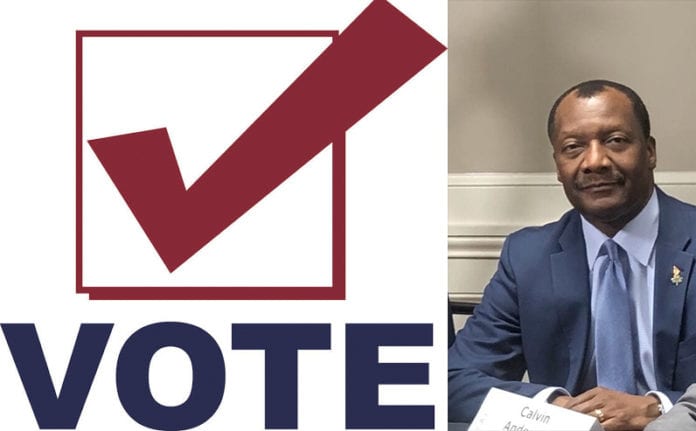by Calvin Anderson —
A special legacy is attached to African Americans and the vote. Advancing that right should be made known anew – and boldly – to all Americans. Despite obstacles and suppression tactics, all citizens must exercise the responsibility of voting.
In the coming election cycle, whether by absentee ballot, Early voting at designated sites or on Election Day at your precinct, continue the Legacy – VOTE!
In 1870 the 15th amendment to the U.S. Constitution granted African-American men the right to vote. (Voting rights for women did not occur until 1920). Yet in 1896, just 27 years later, Louisiana passed “grandfather clauses” to bar former slaves and their descendants from voting. As a result, black voter registration dropped from 44.8 percent in 1896 to 4 percent a mere 4 years later.
Any public policy measure that worked that well was bound to be imitated. Mississippi, South Carolina, Alabama and Virginia all adopted similar “grandfather clauses.” By 1940, only 3 percent of eligible African Americans in the South were registered to vote in the destructive wake of Jim Crow laws, literacy tests, poll taxes and other such means.
Thus began the modern struggle for voting rights.
In 1964, poll taxes were outlawed with the adoption of the 24th Amendment. A fateful year later, non-violent civil rights marchers – attempting to peacefully march from Selma, AL to Montgomery, AL to support voting rights – were attacked by law enforcement officials on the Edmund Pettus Bridge.
That same year, Congress passed and President Johnson signed the Voting Rights Act (VRA) of 1965, prohibiting any election practice that denies the right to vote on account of race. Jurisdictions with a history of discrimination in voting were required to get federal approval for any changes in their election laws before enactment. By the end of that year, 250,000 new black voters were registered.
In 1970, President Richard Nixon signed the first VRA extension. Two years later and on the success of the VRA, Barbara Jordan of Houston and Andrew Young of Atlanta became the first African Americans elected to Congress from the South since Reconstruction. That was followed by Harold Ford Sr. of Memphis in 1974. Today, the Congressional Black Caucus links 55 members.
With bi-partisan support, the VRA improved registration and participation nationally and locally. Extensions were enacted in 1975, 1982 and 2006. Yet, from 2011 to today, there were 18 Section 5 objections to voting laws. Texas, South Carolina, Georgia, North Carolina, Mississippi and Louisiana enacted photo IDs requirements, cuts to early voting sites and restrictions to voter registration. Tennessee joined in this restrictive action, enacting a photo ID requirement law in 2012.
Then in 2013, a crippling ruling by the U.S. Supreme Court – in Shelby (AL) versus Holder – rendered ineffective the pre-approval requirement for voting changes in affected VRA states. In 2016 and as a direct result, 16 million Americans encountered voting problems, including long lines, inaccessible polling places and strict voter-registration complications. An egregious 1.2 million Americans were unable to cast a ballot because of election administration errors. These obstacles and complications were targeted disproportionately toward eligible voters of color.
There are 4,874,000 eligible population voters in Tennessee, yet we rank 45th nationally in registration (approximately 4.1 million registered voters). Voter-participation research shows that Tennessee usually has approximately 60 percent of its eligible registered voters turn out in presidential year general elections; 25 percent turnout in primaries. By rank among states, Tennessee lands at 49.
The Tennessee Secretary of State has initiated online voter registration and there is a bill in the Tennessee General Assembly to advance voter restoration rights for the previously incarcerated. While these efforts could address some voter registration improvements, much is needed to improve voter participation.
Voting is the language of American democracy. The act of voting validates us as citizens of equal standing and confirms what it means to be an American. The late American Civil Rights Movement icon and Congressman John Lewis called voting “the most powerful non-violent tool we have in a democratic society.” This voting right has been gained by blood, sweat, tears and sacrifices against a backdrop of recurring obstacles to the exercise of that fundamental freedom.
This year we observe the anniversaries of the 150th year since enactment of the 15th Amendment, the 100th year of women’s right to vote and the 55th year of the Voting Rights Act. Voting is one of those things in a non-partisan democratic society everyone should agree on. No patriotic adult should want to see or enable any attempts to suppress another citizen’s right and opportunity to vote.
You get to pick your elected officials. Let them know you take voting seriously and that you expect their unwavering support for the free exercise of that right.
Now pending in Congress, HR 4 – the Voting Rights advancement act – establishes a new formula to determine which states and localities with repeated violations must pre-clear election changes. And in January 2021, the Tennessee Restoration bill will be back in the general assembly.
Early voting in Tennessee for the August 6 primary elections is underway and continues through Aug. 1. The general elections are Nov. 3rd.
Register someone; and VOTE!
(Calvin Anderson is president of Best Media Properties, LLC, the parent company of The New Tri-State Defender, and former Tennessee Election Commissioner.)



